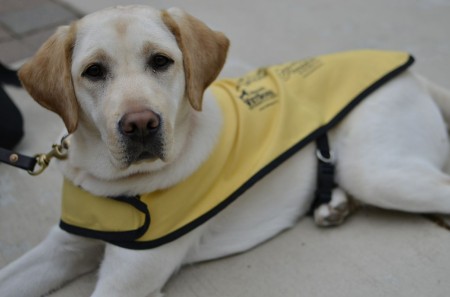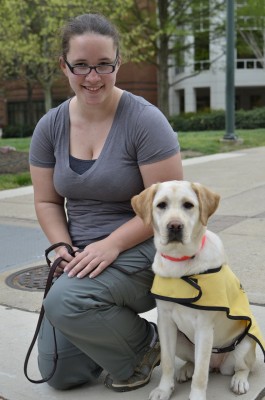Program seeks off-campus students to help raise puppies for future work as service dogs

Joanna Collins is volunteering to help raise a puppy that will even- tually become a service dog for the blind or a veteran. (JAKE MCLERNON/BROADSIDE)
Dozens of people hurry through the Johnson Center, clicking their heels, rolling their bags and chatting loudly on their cell phones. Someone drops a stray piece of food as they rush by, and it rolls across the floor right in front of Sachi, an 8 month-old golden labrador stretched across the floor.
Despite the distraction of the people, smells and noises radiating off the high ceilings and laminate floors, and the temptation of the food that now sits inches from her face, Sachi does no more than to lazily wag her tail as she observes her surroundings.
As part of a program sponsored by the Guide Dog Foundation, Sachi is being raised to be trained as a service dog for the blind, veterans or other people with other disabilities.
But the extensive training required to aid someone with a disability cannot start until the dog is approximately one year old, which is where people like Melissa Harrington come in.
Harrington, local puppy program representative, has brought the Guide Dog Foundation to campus in hopes of recruiting students to help raise puppies for one year.
Joanna Collins, a senior majoring in criminology, is the first student to participate as part of the new partnership.
“I love dogs, and this makes me feel like I’m really helping while doing something fun,” Collins said.
Just days after first hearing about the program, Collins had already began the process of applying to be a raiser and is set to receive her first puppy in the next few weeks.
Collins has been working closely with Harrington to prepare to have the puppy with her at all times, including on campus as she attends summer classes.
Harrington has been raising puppies to prepare them for training for 11 years, and has a deep passion for both the animals and the program.
“We all think as raisers that we help the world,” Harrington said. “But in reality, these dogs help each of us.”
Harrington works with raisers to instill proper behavioral and social training in the young puppies as they spend one year in their temporary home.
Classes are held several times a month at local recreation centers and focus on basic commands and training and socialization.
It is imperative that during the one year raising period, the puppies are properly trained not to jump, lick or rough house.
“When the dogs are young, there is a socialization window where everything they are exposed to becomes natural and normal,” Harrington said. “After about 8 months old, it becomes too late.”
Raisers spend time exploring new situations with the puppies that they will most likely encounter as a service dog, including crowded malls, busy streets and the Metro.
It is important for the public to understand that while the puppies may be at their most adorable at when they begin their preliminary training at 10 weeks old, it is also the most important time to respect their boundaries.
“It’s easy for the young puppies to get over excited,” Harrington said. “Usually we tell the public that the dog is not quite ready for that attention yet, but to check back in a few months. We don’t want to overwhelm the dogs.”
The Guide Dog Foundation, a non-profit organization with no federal funding, covers all expenses for the puppies except for dog food, which raisers must cover on their own.
“It’s a great relationship. The dog will watch t.v. with you and just curl right up on the couch,” Harrington said. “It’s a much calmer relationship than most people have with their pet dogs.”
After the year of raising, the puppies are sent to Smithtown, New York to the Guide Dog Foundation’s state of the Art facility, where they will be fully trained as a service dog.
Harrington said the number one concern among volunteers is that they will become too attached to the puppies they raise.
“Yes, you get attached, and some cry,” Harrington said. “You pour your heart and soul into the experience. It’s a good sad, a good hurt. And usually, it’s cured by someone handing you a wriggling new puppy to start the experience all over again.”
Harrington is hoping to find up to two more students to participate in the program for the next year. Students must go through an application process and live off campus to be eligible.







Comments